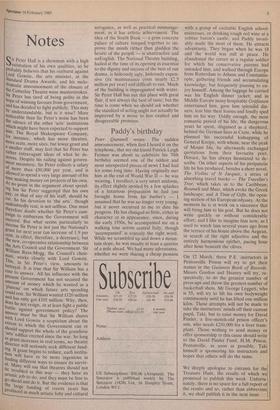Paddy's birthday
Peter Quennell writes: The sudden announcement, when first I heard it on the telephone, that my old friend Patrick Leigh Fermor was about to celebrate his 70th birthday seemed one of the oddest and most unexpected pieces of news I had had for some long time. Having originally met him at the end of World War II — he was wearing, I recollect, a very smart uniform, its effect slightly spoiled by a few splashes of a luxurious preparation he had just brought home from his barber's — I assumed that he was no longer very young; but it never occurred to me to date his progress. He has changed so little, either in character or in appearance, since, during the early 1950s, he accompanied me on a walking tour across central Italy; though `accompanied' is scarcely the right word. While we scrambled up and down a moun- tain slope, he was usually at least a quarter of a mile ahead. We had many adventures, whether we were sharing a cheap pension with a group of excitable English school- mistresses, or drinking rough red wine at a robber baron's castle; and Paddy invari- ably made the most of them. He attracts adventures. They began when he was 18 and the world was still at peace. He abandoned the career as a regular soldier for which his conservative parents had intended him, and walked through Europe from Rotterdam to Athens and Constantin- ople, gathering friends and accumulating knowledge, but frequently pausing to en- joy himself. Among the luggage he carried was his English dinner jacket; and in Middle Europe many hospitable Griifinnen entertained him, gave him splendid din- ners, lent him their horses and fondly sped him on his way. Oddly enough, the most romantic period of his life, the dangerous years he spent, disguised as a shepherd, behind the German lines in Crete, while he planned his successful kidnapping of General Kreipe, with whom, near the peak of Mount Ida, he afterwards exchanged quotations from their favourite poet, Horace, he has always hesistated to de- scribe. On other aspects of his peripatetic life he has produced, besides a short novel, The Violins of St Jacques, a series of absorbing travel books — The Traveller's Tree; which takes us to the Caribbean; Roumeli and Mani, which evoke the Greek landscape; and A Time of Gifts, the open- ing section of his European odyssey. At the moment he is at work on a successor that will bring him to his goal. But he does not write quickly or without considerable effort; and I like to imagine him now, as I used to watch him several years ago from the terrace of his house above the Aegean, in search of the right adjective and the entirely harmonious epithet, pacing hour after hour beneath the olives.














































 Previous page
Previous page